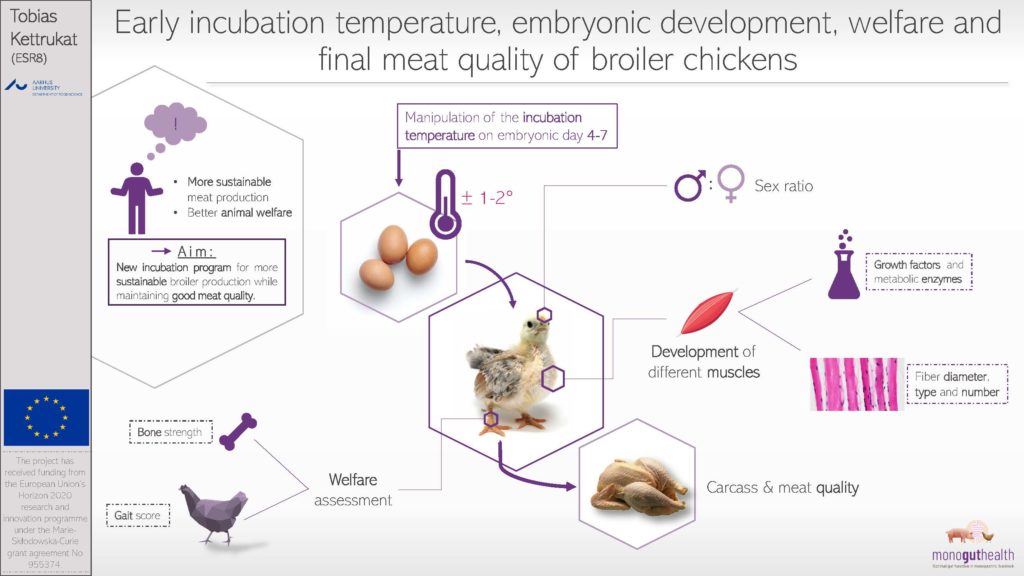ESR8: Early incubation temperature, embryonic development and welfare of broiler chickens
Background
Selective breeding for a higher yield of breast meat has led to dramatic changes in the morphology of modern broilersChickens kept for meat production. Fast growing breeds can reach a weight of over 2 kg at 5 weeks of… compared to traditional types of chicken. Due to increased relative size of M. Pectoralis in relation to leg muscles, impaired gait is a common issue in broilerChickens kept for meat production. Fast growing breeds can reach a weight of over 2 kg at 5 weeks of… flocks, especially at the end of production. With animal welfare being increasingly demanded by the consumer and also being an ethical obligation when keeping animals, there is sufficient need to address this issue.
Studies suggest that by increasing the early incubationKeeping the eggs under defined conditions (ideally 37.8℃ and 55% relative humidity) for the chicks… temperature from embryonic day 4 to 7 it is possible to affect the subsequent muscle and bone development, growth rate and welfare. It is possible to achieve a change in the number of muscle fibers in certain muscles, influencing the broilers’ ability to walk. In addition, manipulation with in ovo temperature may influence the genetic and/or phenotypicSet of observable characteristics or traits of an organism. The term covers the organism’s morpholog… sex of the birds with possible effects on the production efficiency as well as meat quality traits.
Objectives
Identify and understand the effect of early incubationKeeping the eggs under defined conditions (ideally 37.8℃ and 55% relative humidity) for the chicks... temperature of broiler chickensChickens kept for meat production. Fast growing breeds can reach a weight of over 2 kg at 5 weeks of... on embryonic development specifically sex and muscle development, in order to improve the animal welfare as well as production and meat quality traits.
Methods
Assessment of muscle development via growth factors, metabolic enzymes and histology,
Gait scoringA method to evaluate the walking ability of chickens. We use the system developed by Kestin et al. 1...,
Analysis of the dimensions and strength of the Tibia,
Assessment of meat quality via pH, water holding capacity, colour and texture,
Assessment of genetic and phenotypicSet of observable characteristics or traits of an organism. The term covers the organism's morpholog... sex.
Expected results
Using the gained knowledge, a new incubationKeeping the eggs under defined conditions (ideally 37.8℃ and 55% relative humidity) for the chicks... program will be suggested supporting a more sustainable broilerChickens kept for meat production. Fast growing breeds can reach a weight of over 2 kg at 5 weeks of... production with increased animal welfare, maintaining optimal muscle growth and meat quality (D1.10).
The effect of incubationKeeping the eggs under defined conditions (ideally 37.8℃ and 55% relative humidity) for the chicks... temperature on sex of broilersChickens kept for meat production. Fast growing breeds can reach a weight of over 2 kg at 5 weeks of... will be established (D1.4).
Planned secondments
- At: PBS (4 mo); training in early sexing of chicks, phenotypic and genotypic;
- At: SEGES (2 mo); training in novel methods on welfare evaluation in broilers.
Links to other ESRs or WP
Enrolment in Doctoral degree:
ESR8 will be enrolled at the Department of Food Science, Graduate School of Science and Technology, Aarhus University.
Supervisors
Margrethe Therkildsen (AU), Ewa Grochowska (PBS)
